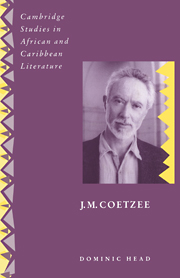Book contents
- Frontmatter
- Contents
- Preface
- List of abbreviations
- Chronology
- 1 The writer's place: Coetzee and postcolonial literature
- 2 Writing violence: Dusklands
- 3 The wrong kind of love: In the Heart of the Country
- 4 An ethical awakening: Waiting for the Barbarians
- 5 Gardening as resistance: Life and Times of Michael K
- 6 The maze of doubting: Foe
- 7 A true confession: Age of Iron
- 8 Producing the demon: The Master of Petersburg
- Notes
- Select bibliography
- Index
1 - The writer's place: Coetzee and postcolonial literature
Published online by Cambridge University Press: 01 March 2010
- Frontmatter
- Contents
- Preface
- List of abbreviations
- Chronology
- 1 The writer's place: Coetzee and postcolonial literature
- 2 Writing violence: Dusklands
- 3 The wrong kind of love: In the Heart of the Country
- 4 An ethical awakening: Waiting for the Barbarians
- 5 Gardening as resistance: Life and Times of Michael K
- 6 The maze of doubting: Foe
- 7 A true confession: Age of Iron
- 8 Producing the demon: The Master of Petersburg
- Notes
- Select bibliography
- Index
Summary
The novels of J. M. Coetzee occupy a special place in South African literature, and in the development of the twentiethcentury novel more generally. His works present a sophisticated intellectual challenge to the particular form of colonial violence embodied in apartheid, though, in some quarters, this has been seen as an oblique rather than a direct challenge. He is the first South African writer to produce overtly self-conscious fictions drawing explicitly on international postmodernism. The presence of European influences has always helped shape the South African literary tradition, so the claim, here, should not be overstated: what Coetzee does is to import contemporary Western preoccupations which produce a stress on textuality to a degree not previously seen in his country's literature. This offers a dual challenge: first to the South African novel, usually seen as more dependent on realist conventions; and second to the broader field of postcolonial writing, which needs to accommodate the unique intermediary position that Coetzee inhabits.
Coetzee was born in Cape Town on 9 February 1940, and grew up in the Karoo, the vast desert and semi-desert area of the Cape province. His family (his father was a lawyer; his mother a schoolteacher) spoke English at home, though, with other relatives, he conversed in Afrikaans. He completed his undergraduate work, studying English and mathematics at the University of Cape Town, in 1961, and moved to England to work in computers in 1962. He stayed for four years, working as a programmer, during which period he wrote a master's thesis on Ford Madox Ford (MA awarded by the University of Cape Town in 1963) (DP, 19).
- Type
- Chapter
- Information
- J. M. Coetzee , pp. 1 - 27Publisher: Cambridge University PressPrint publication year: 1998



